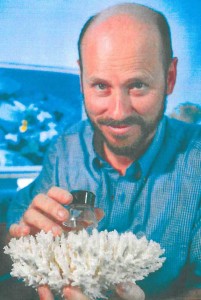NSU Newsroom
SharkBytes
Horizons
This version of NSU News has been archived as of February 28, 2019. To search through archived articles, visit nova.edu/search. To access the new version of NSU News, visit news.nova.edu.
This version of SharkBytes has been archived as of February 28, 2019. To search through archived articles, visit nova.edu/search. To access the new version of SharkBytes, visit sharkbytes.nova.edu.
NSU Research Spotlight: Coral Reefs
Bernhard Riegl, Ph.D., is a man on a mission. An internationally acclaimed coral reef scientist, Riegl understands that without the proper interventions, time is running out for the world’s coral reefs.
“Just as one would not destroy the Mona Lisa or burn down the nation’s capital, one should not destroy nature, the ultimate work of art. With every species lost, the world becomes a poorer place. We may not realize this immediately, but when things are lost, they are lost—and cannot be recreated,” he says.
In this race against time, Riegl has been a whirlwind of activity. Over the past two decades, his work has been featured in 123 peer-reviewed articles. At the same time, he has attracted outside funding of $25 million to support research on coral reefs and associated sea grass and algae.
As a child, Riegl was drawn to science by an interest in observing animals. After finishing his undergraduate studies, he spent a year traveling around the world to meet scientists and learn about their research. After discovering “a knowledge gap about impact dynamics on coral reefs,” he decided to make studying coral reefs his life’s work.
In his NSU activities, he derives deep satisfaction in unraveling complicated context and explaining it to others.
So what should people know about coral reefs?
“They should understand that things on this planet are interconnected, and we are just one part of a bigger system. The more we weaken that system, the more risk there is to us,” Riegl explains.
To read more on NSU Coral Reef Research, Click here.
